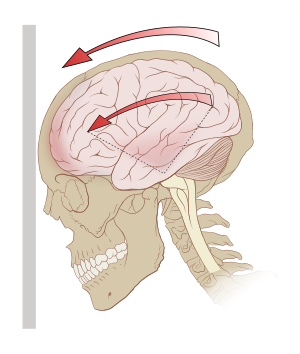Concussions
| Concussion | |
|---|---|
| Synonyms | Mild brain injury, mild traumatic brain injury (MTBI), mild head injury (MHI), minor head trauma |
 |
|
| Acceleration (g-forces) can exert rotational forces in the brain, especially the midbrain and diencephalon. | |
| Specialty | Neurology |
| Classification |
· ·
|
|---|---|
| External resources |
Concussion, also known as minor head trauma or mild traumatic brain injury (mTBI) is the most common type of traumatic brain injury. It is typically defined as a head injury with a temporary loss of brain function. Symptoms include a variety of physical, cognitive, and emotional symptoms, which may not be recognized if subtle. A variety of signs accompany concussion including headache, feeling in a fog, and emotional changeability. In general, the signs can be categorized into physical signs (such as loss of consciousness or amnesia), behavioral changes (such as irritability), cognitive impairment (such as slowed reaction times), and sleep disturbances. Fewer than 10% of sports-related concussions among children are associated with loss of consciousness.
Common causes include sports injuries, bicycle accidents, car accidents, and falls, the latter two being the most frequent causes among adults. In addition to a blow to the head, concussion may be caused by acceleration forces without a direct impact, and on the battlefield, MTBI is a potential consequence of nearby explosions. It is not clear exactly what damage is done and how the symptoms are caused, but stretching of axons and changes in ion channels are involved. Cellular damage has reportedly been found in concussed brains, but it may have been due to artifacts from the studies. It is currently thought that structural and neuropsychiatric factors may both be responsible for the effects of concussion.
Treatment involves monitoring as well as physical and cognitive rest (reduction of such activities as school work, playing video games and text messaging). Symptoms usually resolve within three weeks, though they may persist or complications may occur.
The rate at which concussion occurs is not accurately known, but is estimated to be more than 6 per 1,000 people. Those who have had one concussion seem more susceptible to another, especially if the new injury occurs before symptoms from the previous concussion have completely resolved. There is also a negative progressive process in which smaller impacts cause the same symptom severity. Repeated concussions may increase the risk in later life for dementia, Parkinson's disease, or depression.
...
Wikipedia
